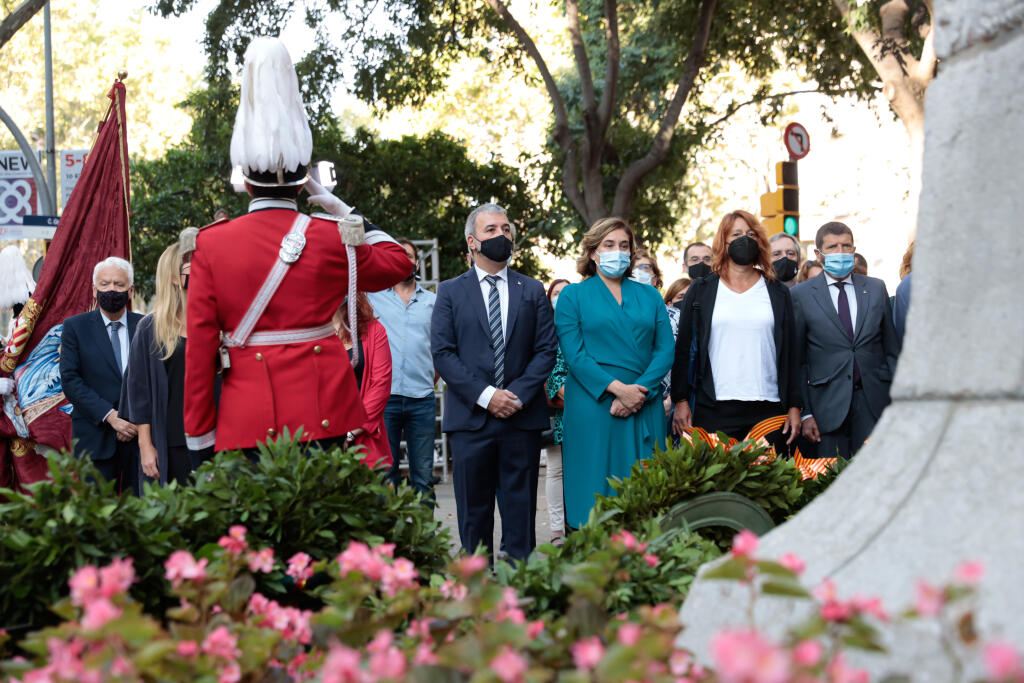11.09.2021 - 15:12
|
Actualització: 11.09.2021 - 17:11
Catalonia’s National Day, known as ‘La Diada’ in Catalan, began on Saturday morning with the traditional floral tribute to Rafael Casanova monument in Barcelona. Government officials and other prominent politicians, including President Pere Aragonès, parliament speaker Laura Borràs and the mayor of the Catalan capital, Ada Colau, lay flowers beside the monument that commemorates the commander-in-chief of Catalonia during the Siege of Barcelona at the end of the War of Spanish Succession.
Injured during the fall of the city on September 11, 1714, when Catalonia lost its sovereignty, Casanova went on to become an icon in the quest to demand greater freedoms and self-rule. The floral tribute, a long-standing tradition, has taken on added significance in recent years due to the ongoing territorial tensions between Spain and Catalonia.
Members of the two main pro-independence parties, Esquerra Republicana and Junts per Catalunya, as well as En Comú Podem, attended the ceremony, as did the Socialists – the only unionist party to take part.
‘We need to follow example of Scotland’
This year the commemorations have been somewhat special since it is the first time they will precede renewed talks between the Catalan and Spanish cabinets on the independence issue. Both executives already met once in February 2020 to tackle the issue and agreed to hold further meetings each month, but Covid-19 and disagreements within the Catalan cabinet prevented this from happening.
“With an overwhelming majority, [the people of Catalonia] want the independence issue to end with negotiations, so today we are taking to the streets so that we are as strong as ever in these talks with Spain next week,” said Esquerra’s presidency minister Laura Vilagrà after the floral tribute.
Speaking to Catalan News, foreign minister Victòria Alsina, appointed by the other coalition partner, Junts, reminded Catalonia has never rejected dialogue: “We will seat at that table [with Spain] and we will put at as starting line the Council of Europe recommendations and the need to follow the example of Scotland,” she said.
Alsina was referring to the European human rights institution approving a report in June calling on Spain to release Catalonia’s jailed pro-independence leaders, withdrawing the extradition requests for their exiled colleagues and reform the crime of sedition for which those behind bars were serving their time at that moment.
“In the parliament we have the largest percentage of pro-independence seats ever, representing 52% of the votes. Another relevant percentage is the people’s support for the organization of an independence referendum. It has been between 70% and 80%, always 10 points more than the requirement Edinburgh and London are talking about for holding a vote in Scotland,” she added.
It is the first National Day since 2017 that the leaders who spent over three years behind bars for the 2017 referendum organization enjoyed the day outside their cells after they were pardoned in June.
Dialogue but not independence
The Socialist leader in Catalonia, Salvador Illa, said they want Catalonia “within Spain, within Europe, open to all.” “We would like today to serve as a day to open a sincere and honest dialogue between all Catalans,” he added.
En Comú Podem (ECP), allies of Unidas Podemos, the junior partner of the Socialists in the Spanish government, sent a similar message.
“Finally, the [independence leaders] are no longer in prison, something that has been backed from different sides for years and that marks a turning point that will focus us towards dialogue,” said ECP’s senior official and Barcelona’s mayor Ada Colau.
Right-wing unionists abstain
As has been the case in past years, Ciudadanos, the conservative People’s Party, and far-right Vox were not present, while far-left pro-independence CUP held its own alternative commemorative events to mark the day.
“The Spanish government, regardless of who is in power, is a Spanish nationalist government that opposes Catalonia’s right to self-determination,” said pro-independence CUP MP Dolors Sabater, expressing her scepticism of the talks with Spain.
Civil society organizations, from Catalonia’s main trade unions to pro-independence groups ANC and Òmnium, as well as Catalan public TV, the main trade unions, FC Barcelona and RCD Espanyol representatives, also attended.


